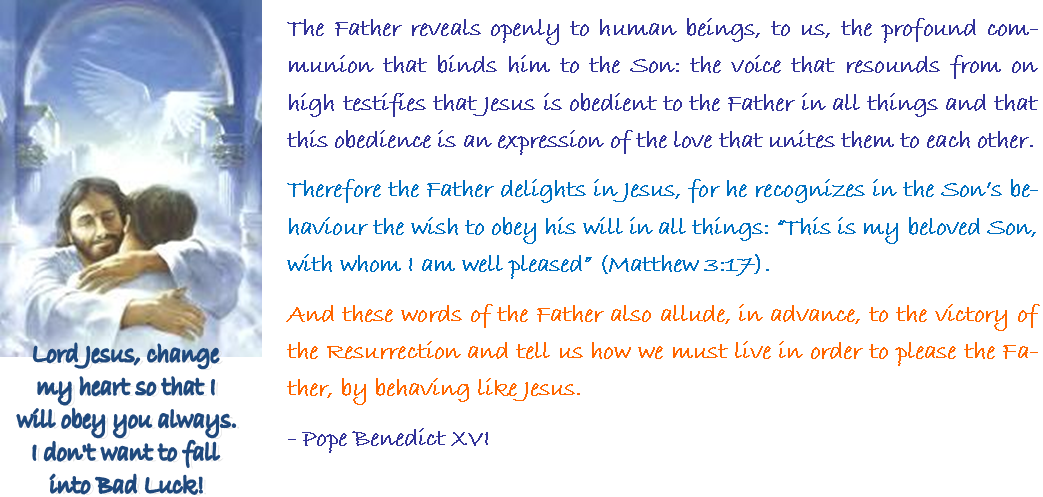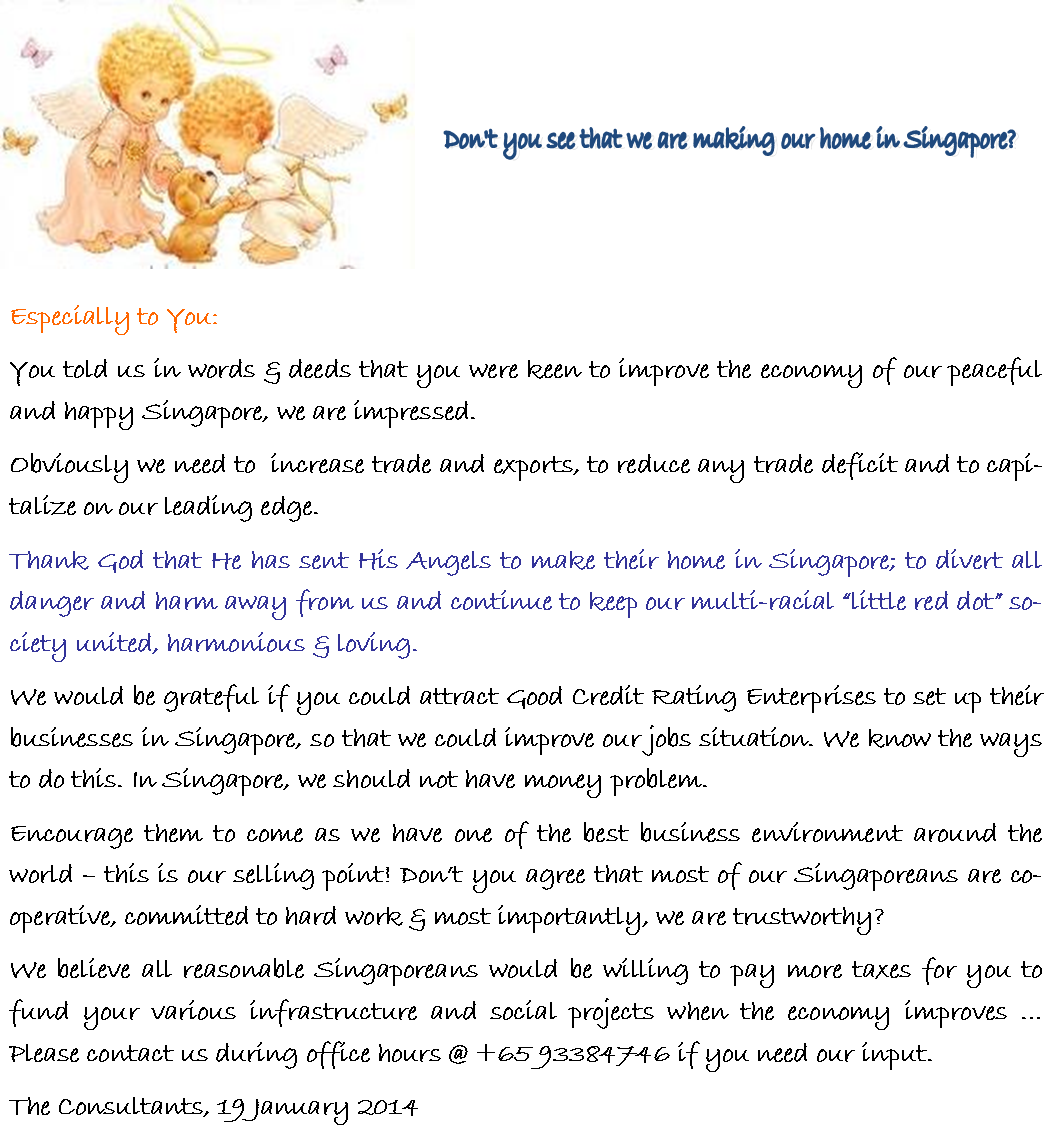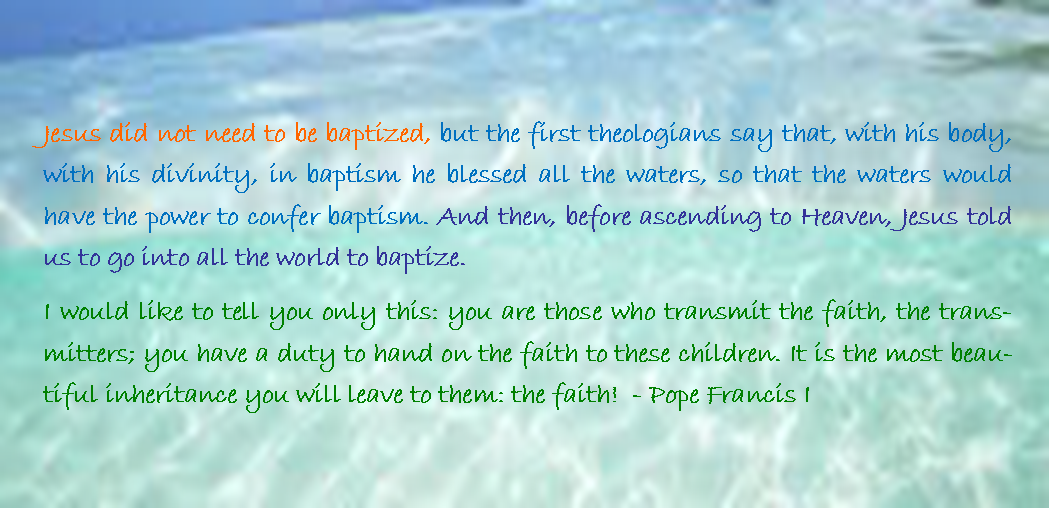|
116 |

|
FEAST OF THE BAPTISM OF THE LORD MASS AND ADMINISTRATION OF THE SACRAMENT OF BAPTISM HOMILY OF HIS HOLINESS BENEDICT XVI Sistine Chapel
Dear Brothers and Sisters,
I am glad to offer a cordial welcome, especially to you, the parents and godparents of the 21 infants to whom, in a little while, I shall have the joy of administrating the sacrament of Baptism. Now a tradition, this year too the Rite is taking place during the Holy Eucharistic Celebration with which we celebrate the Baptism of the Lord. It is the Feast which, on the first Sunday after the Epiphany, concludes the Christmas Season with the Lord’s manifestation at the River Jordan. According to the account of the Evangelist Matthew (3:13-17), Jesus came from Galilee to the River Jordan to be baptized by John; indeed people were flocking from all over Palestine to hear the preaching of this great Prophet and the proclamation of the coming of the Kingdom of God and to receive Baptism, that is, to submit to that sign of penance which calls for conversion from sin.
Although it was called “Baptism” it did not have the sacramental value of the rite we are celebrating today; as you well know, it was actually with his death and Resurrection that Jesus instituted the sacraments and caused the Church to be born. What John administered was a penitential act, a gesture of humility to God that invited a new beginning: by immersing themselves in the water, penitents recognized that they had sinned, begged God for purification from their sins and were asked to change wrong behaviour, dying in the water, as it were, and rising from it to new life.
For this reason, when John the Baptist saw Jesus who had come to be baptized queuing with sinners he was amazed; recognizing him as the Messiah, the Holy One of God, the One who is without sin, John expressed his consternation: he, the Baptist, would himself have liked to be baptized by Jesus. But Jesus urged him not to put up any resistance, to agree to do this act, to do what is fitting “to fulfil all righteousness”.
With these words Jesus showed that he had come into the world to do the will of the One who had sent him, to carry out all that the Father would ask of him. It was in order to obey the Father that he accepted to be made man. This act reveals, first of all, who Jesus is: he is the Son of God, true God as the Father; he is the One who “humbled himself” to make himself one of us, the One who was made man and who accepted to humble himself unto death on a cross (cf. Philippians 2:7).
The Baptism of Jesus, which we are commemorating today, fits into this logic of humility and solidarity: it is the action of the One who wanted to make himself one of us in everything and who truly joined the line of sinners; he, who knew no sin, let himself be treated as a sinner (cf. 2 Corinthians 5:21), to take upon his shoulders the burden of the sin of all humanity, including our own sin. He is the “servant” of Yahweh of whom the Prophet Isaiah spoke in the First Reading (cf. 42:1). His humility is dictated by the desire to establish full communion with humanity, by the desire to bring about true solidarity with man and with his human condition.
Jesus’ action anticipates the Cross, his acceptance of death for man’s sins. This act of abasement, by which Jesus wanted to comply totally with the loving plan of the Father and to conform himself with us, expresses the full harmony of will and intentions that exists between the Persons of the Most Holy Trinity. For this act of love, the Spirit of God revealed himself and descended to alight upon Jesus as a dove, and at that moment the love which unites Jesus to the Father was witnessed to all who were present at the Baptism by a voice from Heaven that everyone heard. The Father reveals openly to human beings, to us, the profound communion that binds him to the Son: the voice that resounds from on high testifies that Jesus is obedient to the Father in all things and that this obedience is an expression of the love that unites them to each other.
Therefore the Father delights in Jesus, for he recognizes in the Son’s behaviour the wish to obey his will in all things: “This is my beloved Son, with whom I am well pleased” (Matthew 3:17). And these words of the Father also allude, in advance, to the victory of the Resurrection and tell us how we must live in order to please the Father, by behaving like Jesus.
Dear parents, the Baptism, that you are asking for your children today, inserts them into this exchange of reciprocal love that is in God between the Father, the Son and the Holy Spirit; through this act that I am about to carry out, God’s love is poured out upon them, showering them with his gifts. Your children, cleansed by the water, are inserted into the very life of Jesus who died on the Cross to free us from sin and in rising, conquered death.
Therefore, spiritually immersed in his death and Resurrection they are set free from original sin and the life of grace is born within them, which is the very life of the Risen Jesus. He “gave himself for us”, St Paul says, “to redeem us from all iniquity and to purify for himself a people of his own who are zealous for good deeds” (Titus 2:14).
Dear friends, in giving us faith, the Lord has given us what is most precious in life, that is, the truest and most beautiful reason for living: it is through grace that we have believed in God, that we have known his love with which he wants to save us and to deliver us from evil. Faith is the great gift with which he also gives us eternal life, true life. Now, dear parents and godparents, you are asking the Church to receive these children within her, to give them Baptism; and you are making this request by virtue of the gift of faith that you yourselves, in turn, have received.
Together with the Prophet Isaiah every Christian can say: “The Lord… formed me from the womb to be his servant” (cf. 49:5); thus, dear parents, your children are a precious gift of the Lord, who has kept their hearts for himself in order to fill them with his love. Today, through the sacrament of Baptism, he consecrates them and calls them to follow Jesus, through the realization of their personal vocation in accordance with that particular plan of love that the Father has in mind for each one of them; the destination of this earthly pilgrimage will be full communion with him in eternal happiness.
In receiving Baptism these children obtain as a gift an indelible spiritual seal, the “character” that inwardly marks their belonging to the Lord for ever and makes them living members of his Mystical Body, which is the Church. While they become part of the People of God, today a journey begins for these children which must be a journey of holiness and of conformation to Jesus, a reality that is placed within them like the seed of a splendid tree whose growth must be nurtured.
Therefore, understanding the greatness of this gift, from the earliest centuries care has been taken to give Baptism to new-born infants. Of course, later there will be the need for a free and conscious adherence to this life of faith and love. For this reason, after Baptism they must be educated in the faith, instructed in accordance with the wisdom of Sacred Scripture and the teachings of the Church so that this seed of faith that they are receiving today may grow within them and that they may attain full Christian maturity. The Church, which welcomes them among her children must take charge of them, together with their parents and godparents, to accompany them on this journey of growth.
Collaboration between the Christian community and the family is especially necessary in the contemporary social context in which the family institution is threatened on many sides and finds itself having to face numerous difficulties in its role of raising children in the faith. The lack of stable cultural references and the rapid transformation to which society is constantly subjected, truly make the commitment to bring them up arduous. Parishes must therefore do their utmost increasingly to sustain families, small domestic churches, in their task of passing on the faith.
Dear parents, together with you I thank the Lord for the gift of the Baptism of your little sons and daughters; in raising our prayers for them, let us invoke in abundance the gift of the Holy Spirit, who today consecrates them in the image of Christ the Priest, King and Prophet. As I entrust them to the motherly intercession of Mary Most Holy, let us ask for life and health for them, so that they may grow and mature in the faith and with their lives bear fruits of holiness and of love. Amen!
Acknowledgment: We thank the Vatican Publisher for allowing us to publish the Homilies of Pope Benedict XVI, so that it could be accessed by more people all over the world; as a source of God’s encouragements to all of us. 19 January 2013 |
|
FEAST OF THE BAPTISM OF THE LORD HOMILY OF POPE FRANCIS Sistine Chapel
Jesus did not need to be baptized, but the first theologians say that, with his body, with his divinity, in baptism he blessed all the waters, so that the waters would have the power to confer baptism. And then, before ascending to Heaven, Jesus told us to go into all the world to baptize. And from that day forward up until today, this has been an uninterrupted chain: they baptized their children, and their children their own, and those children... And also today this chain continues.
These children are a link in a chain. You parents have a baby boy or girl to baptize, but in some years they will have a child to baptize, or a grandchild... Such is the chain of faith! What does this mean? I would like to tell you only this: you are those who transmit the faith, the transmitters; you have a duty to hand on the faith to these children. It is the most beautiful inheritance you will leave to them: the faith! Only this. Today, take this thought home with you. We must be transmitters of the faith. Think about this, always think about how to hand on the faith to your children.
Today the choir sings, but the most beautiful choir is the children making noise... Some of them will cry, because they are uncomfortable or because they are hungry: if they are hungry, mothers, feed them with ease, because they are the most important ones here. And now, with this awareness of being transmitters of the faith, let us continue with the rite of Baptism.
Acknowledgment: We thank the Vatican Publisher for allowing us to publish the Homily of Pope Francis I, so that it could be accessed by more people all over the world; as a source of God’s encouragements to all of us.
26 January 2014 |


|
We are happy to hear in the News that ‘now China is using a low-cost, and efficient technique, dubbed "handmade cloning" to mass-produce cloned pigs’. Besides good for medical research, are these cloned pigs safe for consumption? If yes, then it would be a great way to solve the problem on food shortage around the world, providing more roasted pork, ham and bacon. Obviously, there is no ethical or moral issues involved in ‘Cloning Pigs’ as far as ‘No Cloning of Human Beings’ is involved at this stage or later. Another important consideration: ‘Cloning of human parts’ is also different from ‘Cloning of the entire human being’. Concerning ‘Cloning of Human Beings’, we will leave to the Universal Church founded by Jesus Christ to comment. Every human being is made in the image of God and his / her wellbeing & dignity should not be compromised or violated even from the point of conception. This is the fact and decree established by the Almighty God. 0n 4 November 2000, Blessed Pope John Paul addressed the following to Government Leaders (See Encouragements-147): “I would like to speak in a particular way to those of you who have the very delicate task of formulating and approving laws: a task which brings man close to God, the Supreme Legislator, from whose Eternal Law the validity and the obligatory force of every other law is ultimately derived. This is precisely the meaning of the dictum that positive law cannot contradict the natural law, the latter being nothing other than the expression of the primary and essential norms regulating the moral life and consequently the characteristics, the most profound requirements and the loftiest values of the human person. As I have already had occasion to state in the Encyclical Evangelium Vitae, "the basis of these values cannot be provisional and changeable 'majority' opinions, but only the acknowledgment of an objective moral law which, as the 'natural law' written in the human heart, is the obligatory point of reference for civil law itself" (No. 70). This means that laws, whatever the areas in which the legislator intervenes or is obliged to intervene, must always respect and promote human persons - in all the variety of their spiritual, material, personal, family and social needs. Hence a law which does not respect the right to life - from conception to natural death - of every human being, whatever his or her condition - healthy or ill, still in the embryonic stage, elderly or close to death - is not a law in harmony with the divine plan.” As for me and my house, we will serve the Lord and obey His Will. I am going to use the good brains given by the Almighty to please Him, this is the Only Way to be Well and Prosperous. 8-) I don’t want to end up like that king David, see Encouragements-256. - The Consultants, 23 January 2014 |
